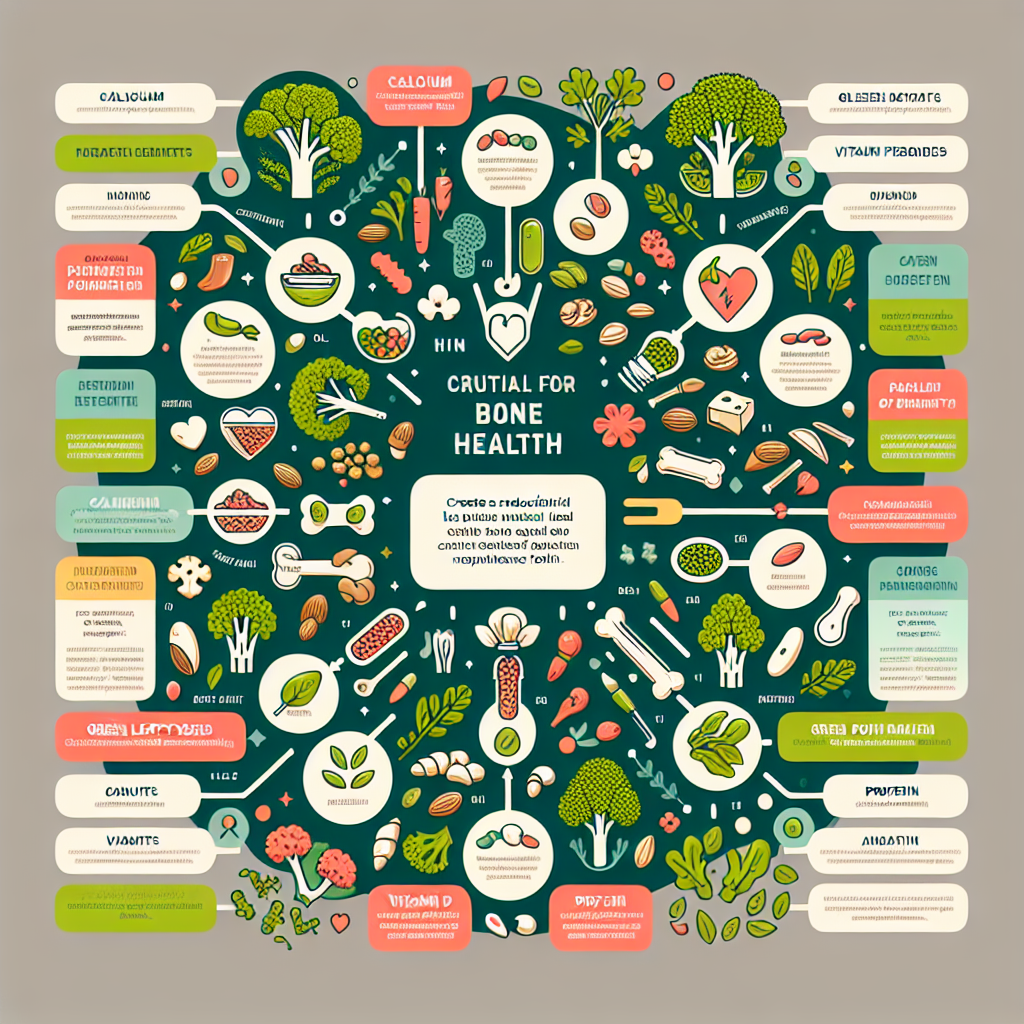In recent years, plant-based diets have gained popularity not just among those advocating for animal welfare and environmental sustainability, but also among individuals seeking to improve their health. However, one of the concerns that arises with such dietary choices is their impact on bone health. This article delves into the intricate relationship between plant-based diets and bone health, providing insights into how you can maintain strong bones while adhering to a diet that is rich in plants.
Understanding Bone Health
Before exploring the effects of plant-based diets on bones, it’s important to understand what constitutes bone health. Bones are living tissues that constantly remodel themselves. This process involves the breaking down of old bone and the formation of new bone. Good bone health is characterized by bone density and bone quality that are sufficient to prevent fractures and support our bodies’ structures.
Several factors contribute to bone health, including genetics, physical activity, and nutrition. Among these, nutrition plays a pivotal role. Critical nutrients for bone health include calcium, vitamin D, protein, and other micronutrients like magnesium, vitamin K, and phosphorus.
Nutritional Considerations in Plant-Based Diets
Plant-based diets can offer all the necessary nutrients for maintaining healthy bones, provided they are well-planned. However, individuals on plant-based diets need to be mindful of certain nutrients that are essential for bone health.
Calcium and Vitamin D
Calcium is the cornerstone mineral of bone health, and vitamin D is crucial for calcium absorption. While dairy products are known for their high calcium content, there are plenty of plant-based sources of calcium, such as fortified plant milks, tofu, and green leafy vegetables like kale and collard greens. Vitamin D can be more challenging to obtain from plant-based sources, but fortified foods and sensible sun exposure can help maintain adequate levels.
The Significance of Silicon for Bone Health further explores an often-overlooked mineral in the context of bone health, which can be found in plant-based foods like whole grains and vegetables.
Protein
Protein is essential for bone structure and repair. Although plant-based diets are sometimes considered lower in protein, many plant foods are rich in protein, such as legumes, nuts, seeds, and whole grains. Balancing these sources is key to ensuring a complete amino acid profile for optimal bone health.
The Role of Vitamin K2 in Bone Metabolism discusses another crucial nutrient for bone health, which can be found in fermented plant foods like natto.
Micronutrients
Micronutrients like magnesium, phosphorus, and vitamin K are abundant in a variety of plant foods. Seeds, nuts, beans, and whole grains are rich in magnesium, which works with calcium to build strong bones. Phosphorus is widely available in plant foods and helps in bone formation. Vitamin K, particularly K2, is found in fermented plant foods and is vital for bone mineralization.
It’s also worth noting that some plant compounds, such as oxalates and phytates, can inhibit calcium absorption. However, these effects can be mitigated by proper meal planning, such as soaking beans and grains and choosing low-oxalate greens for calcium sources.
For those interested in the relationship between exercise and bone health, Evaluating the Benefits of Yoga for Bone Health offers insights into how certain physical practices can support bone density.
Research on Plant-Based Diets and Bone Health
The scientific community has shown interest in the effects of plant-based diets on bone health. Several studies have indicated that well-planned vegetarian and vegan diets can support healthy bones, though there are mixed results regarding fracture risks.
Studies Supporting Plant-Based Diets
Some research has found that vegetarians have similar bone mineral density (BMD) to non-vegetarians, especially when their diets are rich in fruits, vegetables, and legumes. These foods contribute not only calcium and protein but also other bone-supportive nutrients like potassium and magnesium, which may counteract the acidity of the typical Western diet, thus promoting bone health.
Concerns and Considerations
Conversely, other studies suggest that vegans, particularly those who do not ensure adequate intake of calcium and vitamin D, may have a higher risk of fractures. It’s crucial for individuals on plant-based diets to be conscientious about their nutrient intake and to consider supplements if necessary.
For a deeper understanding of the essential nutrients for bone health and how to obtain them on a plant-based diet, Bone Health provides a comprehensive overview.
External Resources for Further Reading
To enhance your understanding of bone health on a plant-based diet, here are some niche resources:
- A scientific review on The American Journal of Clinical Nutrition website that analyzes the relationship between vegetarian diets and bone health.
- An article on the International Osteoporosis Foundation website that offers a global perspective on bone health and nutrition.
- A research study available through the National Institutes of Health that delves into the effects of various diets on bone density and fracture risk.
- An expert opinion piece on the Academy of Nutrition and Dietetics website discussing how to optimize a vegetarian or vegan diet for bone health.
Practical Tips for Supporting Bone Health on a Plant-Based Diet
To ensure that you are supporting your bone health while enjoying the benefits of a plant-based diet, consider the following tips:
- Diversify Your Diet: Include a variety of fruits, vegetables, legumes, nuts, and seeds to get a broad spectrum of nutrients.
- Seek Fortified Foods: Choose plant milks, cereals, and juices that are fortified with calcium and vitamin D.
- Monitor Vitamin D Levels: Get adequate sun exposure or consider a vitamin D supplement, especially in the winter months or if you have limited sun exposure.
- Be Mindful of Food Preparation: Soak, sprout, or ferment grains and legumes to improve mineral absorption.
- Consider Supplements: If your diet falls short in certain nutrients, supplements can be a practical way to ensure adequate intake.
- Stay Active: Combine your diet with weight-bearing exercises, which are known to strengthen bones.
By taking a holistic approach that combines diet, lifestyle, and possibly supplementation, you can maintain and even improve your bone health on a plant-based diet. Always consult with a healthcare provider or a dietitian to tailor these recommendations to your individual needs.
In conclusion, while plant-based diets require careful planning to ensure all nutritional needs are met, they can provide all the necessary components for strong and healthy bones. By making informed choices and possibly incorporating fortified foods or supplements, those on a plant-based diet can enjoy the benefits of a compassionate lifestyle without compromising their bone health.



